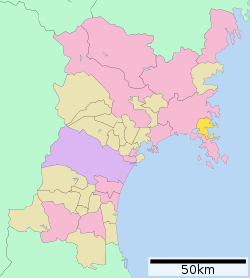Onagawa, Miyagi
| Onagawa 女川町 | |||
|---|---|---|---|
| Town | |||
|
Onagawa urban area in 1975 | |||
| |||
 Location of Onagawa in Miyagi Prefecture | |||
 Onagawa
| |||
| Coordinates: 38°26′17″N 141°27′00″E / 38.43806°N 141.45000°ECoordinates: 38°26′17″N 141°27′00″E / 38.43806°N 141.45000°E | |||
| Country | Japan | ||
| Region | Tōhoku | ||
| Prefecture | Miyagi | ||
| District | Oshika | ||
| Area | |||
| • Total | 65.80 km2 (25.41 sq mi) | ||
| Population (June 2014) | |||
| • Total | 6,993 | ||
| • Density | 106/km2 (270/sq mi) | ||
| Time zone | Japan Standard Time (UTC+9) | ||
| - Tree | Cryptomeria | ||
| - Flower | Sakura | ||
| - Bird | Black-tailed gull | ||
| - Fish | Skipjack tuna | ||
| Phone number | 0225-54-3131 | ||
| Address | 136-banchi Onagawa Onagawahama, Onagawa-chō, Oshika -gun, Miyagi-ken 986-2292 | ||
| Website | Official website | ||
Onagawa (女川町 Onagawa-chō) is a town located in Miyagi Prefecture, Japan. As of June 2014, the town had an estimated population of 6,993 and a population density of 106 persons per km². The total area was 65.80 km².
Geography
Onagawa is located on the rugged rias Pacific coast of north-central Miyagi Prefecture. Onagawa is a port town, and right at the intersection of two major ocean currents. It is also the location of a nuclear power plant, the Onagawa Nuclear Power Plant.
Neighboring municipalities
- Miyagi Prefecture
History
The area of present-day Onagawa was part of ancient Mutsu Province, and has been settled since at least the Jomon period by the Emishi people. During later portion of the Heian period, the area was ruled by the Northern Fujiwara. During the Sengoku period, the area was contested by various samurai clans before the area came under the control of the Date clan of Sendai Domain during the Edo period, under the Tokugawa shogunate.
The modern village of Onagawa was established on 1 June 1889 with the establishment of the municipalities system.
The port of Onagawa, with its deep and sheltered harbor, has long been important both commercially and militarily. The port was hit by an air raid on 9 August 1945 which sank several ships, during the closing days of World War II. A memorial to Canadian Royal Navy Fleet Air Arm pilot Robert Hampton Gray who died in the attack, was unveiled in the town in 1989.
Onagawa was raised to town status on 1 April 1956.
2011 earthquake and tsunami
Onagawa was heavily damaged in the 11 March 2011 Tōhoku earthquake and tsunami. The tsunami reached 15 metres (49 ft) in height and swept 1 kilometre (0.62 mi) inland, destroying the town centre and leaving over 1,000 people missing, with over 300 confirmed dead.[1][2] At least 12 of the town's 25 designated evacuation sites were inundated by the tsunami. The city had previously been hit and partially destroyed by the tsunami caused by the 1960 Valdivia earthquake.[3]
In an incident widely reported in the Chinese media, Mitsuru Sato, managing director of Sato Suisan, a fish processing company in the town, gave his life ensuring that all the firm's workers, including 20 female Chinese resident trainees, had evacuated safely to higher ground.[4]
Rebuilding efforts in town were significantly supported by the work of Pritzker Architecture Prize winner Shigeru Ban, who provided designs both for temporary housing shelters in the town as well as the rebuilt Onagawa Station building opened 21 March 2015.[5]
Economy
The economy of Onagawa is largely based on commercial fishing, primarily the cultivation of oysters, and fish processing.
Transportation
Railway
- East Japan Railway Company (JR East) – Ishinomaki Line
Highway
National highways
Ferry services
Local attractions
The town takes pride in the fact that it still has beaches with "squeaking sand", which has apparently become rare in Japan due to human induced environmental changes.[6]
International Relations
 USA – Winona, Minnesota, USA [7]
USA – Winona, Minnesota, USA [7]
Notable people from Onagawa
- Masatoshi Nakamura, actor[8]
References
- ↑ India rescue team pitches in, The Japan Times 4 April 2011
- ↑ NOAA Data
- ↑ Kyodo News, "Tsunami hit more than 100 designated evacuation sites", The Japan Times, 14 April 2011, p. 1.
- ↑ Pulvers, Roger, "Japan's crises spark wide alarm and some unlikely sympathizers", The Japan Times, 27 March 2011, p. 8.
- ↑ "Onagawa Station Opening Ceremony". www.shigerubanarchitects.com. Shigeru Ban Architects. Retrieved 3 June 2015.
- ↑ Onagawa Town website
- ↑ City of Winona Sister-City Website
- ↑ Official profile Retrieved 7 September 2013. (Japanese)
External links
- Onagawa official website (Japanese)
- Phelan, Stephen (March–April 2013). "Washed Away". Boston Review.
| ||||||||||||||||||
|

